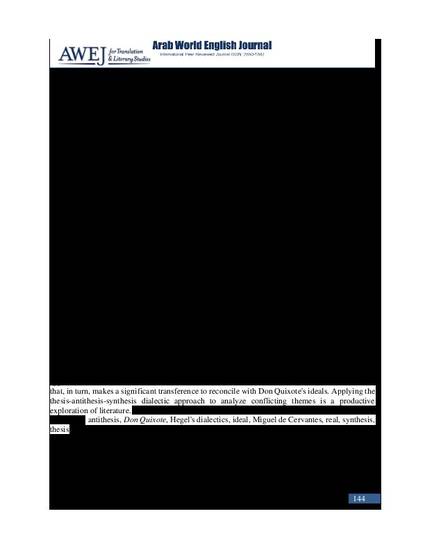
Article
The Ideal and the Real in Cervantes’s Don Quixote: A Hegelian Dialectic Approach
AWEJ for Translation & Literary Studies
(2022)
Abstract
This research project studies the real and the ideal in Miguel de Cervantes’s Don Quixote from a Hegelian dialectic perspective. Hegel’s framework of thesis, antithesis and synthesis is applicable to the analysis of the opposing themes of idealism and realism in the novel. Three main questions have been dealt with: First, what makes up Don Quixote’s idealism? Second, what are the main components of realism that stand in his way? Third, what is the outcome of the interaction between the ideal and the real? The study has managed to answer its key research questions: First, idealism in the novel is exemplified by Don Quixote who believes in chivalry principles as unquestionably truthful and genuine. Second, realism is mainly represented by Sancho and the characters that are concerned with immediate practical preoccupations and material matters. Third, Quixote’s application of his version of idealism witnesses a transfer towards a concession to the real world that, in turn, makes a significant transference to reconcile with Don Quixote’s ideals. Applying the thesis-antithesis-synthesis dialectic approach to analyze conflicting themes is a productive exploration of literature.
Keywords
- antithesis,
- Don Quixote,
- Hegel’s dialectics,
- ideal,
- Miguel de Cervantes,
- real,
- synthesis,
- thesis
Disciplines
Publication Date
Spring May 15, 2022
DOI
http://dx.doi.org/10.24093/awejtls/vol6no2.11
Citation Information
Bechir Saoudi. "The Ideal and the Real in Cervantes’s Don Quixote: A Hegelian Dialectic Approach" AWEJ for Translation & Literary Studies Vol. 6 Iss. 2 (2022) p. 144 - 164 ISSN: 2550-1542 Available at: http://works.bepress.com/awejfortranslation-literarystudies/337/